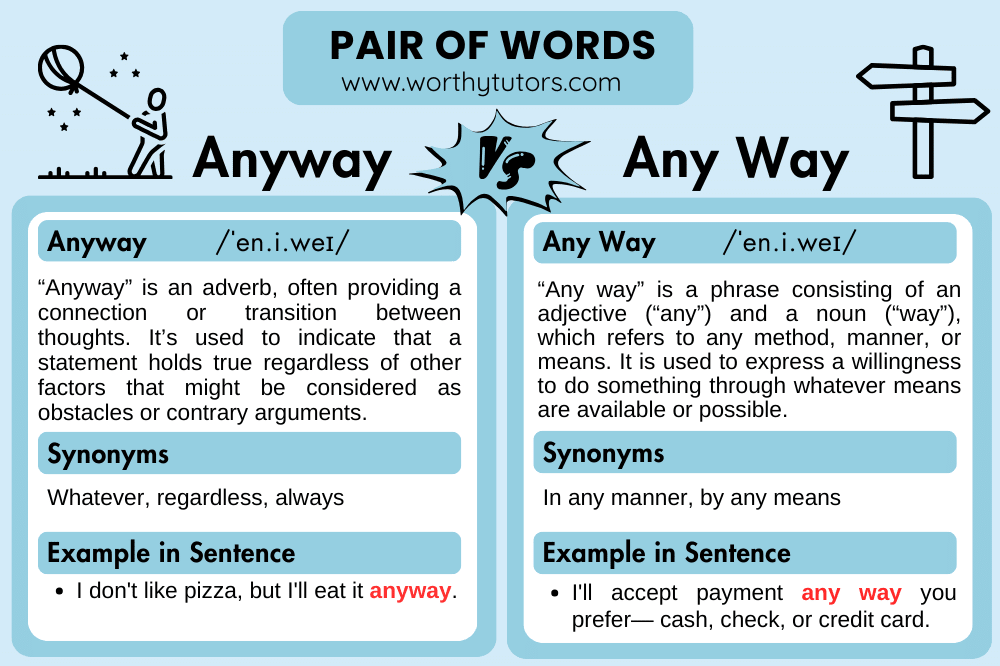
Differences Between “Anyway” and “Any Way”
The English language is replete with words and phrases that, while similar in sound, carry distinct meanings. This confusion is prevalent among students who encounter similar-sounding terms and struggle to discern their distinctions. One such pair of words that frequently perplexes learners is “anyway” and “any way.” Despite their phonetic similarity, these two expressions diverge significantly in meaning and usage. This article delves into their definitions, uses, and the subtle differences that set them apart.
Pronunciation of “Anyway” and “Any Way”
Both “anyway” and “any way” are pronounced the same way: /ˈen.i.weɪ/, which sounds like “en-ee-way”.
Anyway : Explanation
“Anyway” is an adverb, a word that modifies verbs, adjectives, or other adverbs, often providing a connection or transition between thoughts. It’s used to indicate that a statement holds true regardless of other factors that might be considered as obstacles or contrary arguments. For instance, one might say, “It was raining, but we decided to go for a walk anyway.” Here, “anyway” signifies a continuation of action despite the deterrent of rain.
Synonyms of Anyway
“Anyway” can be replaced with words like whatever, regardless, always, nevertheless, and in any case. It’s used to convey a sense of continuation or conclusion despite circumstances
Examples of “Anyway” in Sentences
- I knew it might be closed, but I went to the store anyway.
- He didn’t think it was a good idea, but she proceeded anyway.
- I don’t like pizza, but I’ll eat it anyway.
- I didn’t plan to go out, but anyway, I changed my mind.
- She didn’t need my help, but I offered it anyway.
- The weather forecast predicted rain, but I decided to go hiking anyway.
Any Way | Explaination
On the other hand, “any way” is a phrase consisting of an adjective (“any”) and a noun (“way”), which refers to any method, manner, or means. When someone says, “I’ll help you any way I can,” they’re expressing a willingness to assist through whatever means are available or possible.
Synonyms of “Any Way”
The phrase “any way” can be associated with flexibility and various possibilities. While it doesn’t have direct synonyms like single words do, it can be contextually replaced with phrases that convey a similar meaning of openness to different methods or approaches. Here are some expressions that can be used interchangeably with “any way” depending on the context:
- In any manner
- By any means
- Whichever method
- However possible
- Through any route
Examples of “Any Way” in Sentences
- Is there any way to solve this puzzle?
- You can arrange the furniture any way you like.
- You can complete the project any way you like.
- Is there any way we can solve this problem peacefully?
- I’ll accept payment any way you prefer—cash, check, or credit card.
- We need to find any way possible to increase our productivity.
Key Differences Between “Anyway” and “Any Way”
The key to distinguishing between “anyway” and “any way” lies in understanding their roles in a sentence. “Anyway” is singular in its form and function as an adverb, while “any way” is a flexible phrase that can be adapted to various contexts. A helpful mnemonic is to remember that “anyway” is used when there’s no alternative way considered, whereas “any way” implies multiple possibilities or methods.
Summary
In summary, “anyway” and “any way” serve different purposes in communication. “Anyway” is your go-to word for moving forward with a point or action, regardless of hindrances. “Any way,” however, opens the door to various methods or approaches. Recognizing these distinctions is crucial for effective communication and can enhance both writing and speech by providing clarity and precision.
Fill in the Blank Exercise for Students on “Anyway vs. Any Way”
- Fill in the blanks by using inserting anyway or any way.
- I’m tired, but _____, I’ll finish this work.
- Is there _____ we can solve this issue peacefully?
- He didn’t need my help, but I offered it _____.

About Authoress
Mahnoor Jehangir is a seasoned educator and linguist, specializing in English language and literature. With a master’s degree in English and applied linguistics, Mahnoor serves as a subject lead, while also indulging her passion for writing, exploring the nuances of language and storytelling.